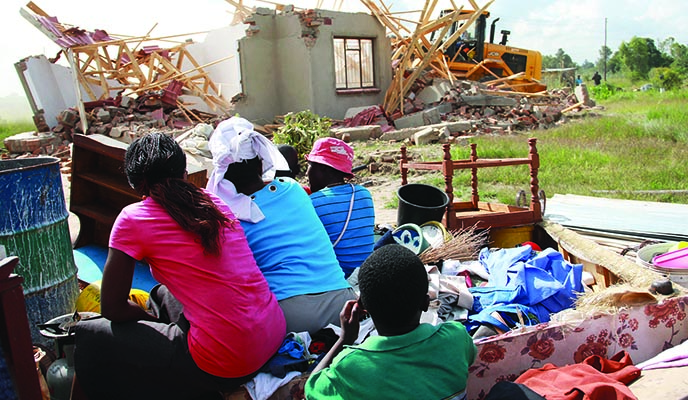
CASPER Ndlovu (not his real name) leads a life of uncertainty. He literally lives on his toes at what he calls his residential stand at an illegal settlement that has cropped up between Glen Norah A and Glen Norah B in Zimbabwe’s capital, Harare.
BY TAPIWA ZIVIRA
The 31-year-old has since built a makeshift, two-roomed flat-roof house, after making his calculations whose answer convinced him that a “rootless” life could just save him a fortune in rentals.
“I was paying $150 every month in rent when I was still staying in Budiriro, but when I got this stand, I used less than $600 to build this house you see,” he says, pointing at his makeshift house.
“Do the maths, it cost me four months’ worth of rentals to build a house and I have spent a year here, and imagine if I spend another year here, how much would I have saved?”
His story is almost similar to that of his unemployed neighbour, who believes he will not lose much if the settlement is declared illegal.
“It is better staying here for as long as I can than to move back to Glen View as a tenant and pay monthly rentals, which I cannot afford at this time,” he said.
- Chamisa under fire over US$120K donation
- Mavhunga puts DeMbare into Chibuku quarterfinals
- Pension funds bet on Cabora Bassa oilfields
- Councils defy govt fire tender directive
Keep Reading
This new practice has proved costly to house owners in the nearby high-density suburbs, who are now struggling to attract tenants, forcing them to slash rentals by up to 50%.
As the economic crisis in Zimbabwe deepens, it is hitting hard on the pockets of residential tenants who are now being forced to move to informal settlements where they can get cheap, but unofficial residential stands on which they build makeshift houses.
The development comes in the wake of recent demolitions of houses built on undesignated land in Aspindale and Budiriro.
The City of Harare pulled down over 200 houses, leaving hundreds of families in the cold, a development that the Harare Residents’ Trust (HRT) has called “evil”.
“Housing demolitions by the Government of Zimbabwe through its local agency, the City of Harare, are evil and unconstitutional. There is no sane government anywhere in the world where the government allows such disregard of human rights,” wrote HRT on its Facebook page.
“Whoever is behind these demolitions does not deserve to serve in the government of the people.”
But for those who live there, the idea behind building the most basic structures is that they are prepared for the eventuality of their houses being pulled down.
What matters to them, though, is that by the time the council moves in to demolish their settlements, they would have saved a lot of money that could have been used to pay rentals.
A snap survey by NewsDay Weekender in Highfield and Glen Norah showed that a room, which used to cost about $60 per month, now ranges between $30 and $40.
Some house owners have become so desperate they now allow lodgers to check-in and pay the rent later, while others have been forced to slash their rentals by over 50% as unoccupied houses have become a common sight in the ghetto.
“After spending five months with two of my rooms empty, I decided to cut my rent from $120 to $70 because everyone who had showed interest in renting the rooms appeared to have been pushed away by the amount I was charging,” one Highfield landlord said.
While it is uncommon, if not unheard of, that tenants are allowed in without paying any cent, this reporter witnessed six such occurrences in Highfield, while a chat with some residents showed the demand for accommodation had gone down such that landlords could do anything to attract tenants.
“It is better to have someone owe you money than to have your house empty and expect nothing,” said a Glen Norah landlady, Mavis Kuipa.
But how exactly the economic crisis and the resulting cash crunch is pushing down rentals is that, according to people interviewed, urban dwellers are moving to informal and often unserviced settlements that are sprouting all over the city as a cost-cutting measure, although this speaks to a rather unstable life.












